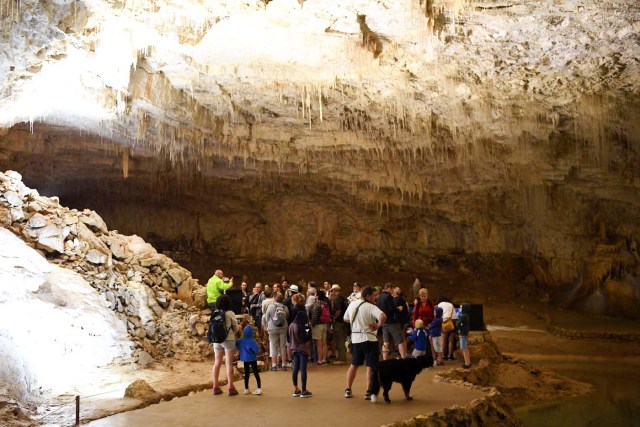
/ AFP PHOTO / JEAN-PIERRE CLATOT
Para luchar contra una intensa ola de calor en el sureste de Francia, cientos de turistas se agolpan en las cuevas de la región, oasis naturales de frescura que registran un aumento significativo de las visitas.
“¡La gente nos dice que es genial disfrutar de este aire acondicionado natural!”, cuenta a la AFP Linda Benini, encargada de la clientela de la Grotte de Saint-Marcel, una espectacular cueva de la región francesa de Ardèche. “Aquí dentro hace 14 grados y los turistas están encantados”.
La visita de sus inmensas galerías y de su impresionantes cascada creada por acumulación de distintos minerales, única en Europa, dura una hora. Los visitantes descienden hasta 150 metros bajo tierra.
En momentos en que el sureste de Francia se enfrenta a una ola de calor con temperaturas que rozan los 40 grados, este sitio turístico registra un aumento de al menos 10% del número de visitantes. “Vienen muchos franceses, pero también muchos turistas extranjeros, europeos e incluso americanos”, explica Linda Benini.
Lo mismo ocurre en la cueva de la Madeleine, en Saint-Remèze, Ardèche. “En estos momentos tenemos más visitantes”, apunta el responsable del sitio, Frédéric Giordan. “Aquí dentro, a 150 metros bajo tierra, hace 15 grados”, detalla.
En promedio, entre 400 a 600 personas visitan esta sitio en verano. “Es la belleza de este lugar la que atrae a los turistas” en primer lugar, estima Giordan, que explica que “el mal tiempo atrae también más visitantes.
– Récord de calor –
En el macizo de Vercors, en los Alpes, la gente viene en búsqueda de un poco de frescura en altitud: las pequeñas cascadas y otros puntos de agua son tomados por asalto, al igual que las cuevas.
En la cueva de Choranche, cerca de Lyon (este), se registra al menos 300 visitantes más por día, confirma Florence Delorme, encargada de la comunicación del sitio.
Con estas temperaturas, “todo el mundo busca un poco de aire fresco. Nos estamos organizando para acoger a los turistas y disminuir el tiempo de espera”, afirma. El sitio recibe actualmente hasta 1.400 visitantes diarios.
A cuarenta kilómetros de Lyon, donde el termómetro subió a 38 grados, las cuevas de Balme no dudan en usar la frescura como un argumento para atraer a más visitantes.
“Cuando tenemos temperaturas como estas, comunicamos a través de las redes sociales y en nuestro sitio web las temperaturas dentro de las cuevas, entre 12 a 15 grados todo el año”, señala su director Jean-Michel Colomb.
Esta cueva oculta dentro de una montaña que domina el Ródano recibe durante el verano a unas 550 personas por día en promedio. Con estas temperaturas caniculares, “podemos esperar un aumento”, predice, recordando que durante la ola de calor de junio “la frecuentación aumentó en un 20%”.
El sureste de Francia vive una intensa ola de calor que podría prolongarse hasta el domingo, con temperaturas que rozan los 40 grados. El jueves se registró un récord de calor en la isla de Córcega, con 42 grados registrados en Sartène, en el sur de la isla.
AFP
Since the beginning of the heat wave, there has been an increase of at least 10 percent in the number of cave visitors, looking for beautiful natural sites, but also for underground freshness with temperatures around 15 Degrees Celsius. / AFP PHOTO / JEAN-PIERRE CLATOT
Since the beginning of the heat wave, there has been an increase of at least 10 percent in the number of cave visitors, looking for beautiful natural sites, but also for underground freshness with temperatures around 15 Degrees Celsius. / AFP PHOTO / JEAN-PIERRE CLATOT
Since the beginning of the heat wave, there has been an increase of at least 10 percent in the number of cave visitors, looking for beautiful natural sites, but also for underground freshness with temperatures around 15 Degrees Celsius. / AFP PHOTO / JEAN-PIERRE CLATOT
Since the beginning of the heat wave, there has been an increase of at least 10 percent in the number of cave visitors, looking for beautiful natural sites, but also for underground freshness with temperatures around 15 Degrees Celsius. / AFP PHOTO / JEAN-PIERRE CLATOT
Since the beginning of the heat wave, there has been an increase of at least 10 percent in the number of cave visitors, looking for beautiful natural sites, but also for underground freshness with temperatures around 15 Degrees Celsius. / AFP PHOTO / JEAN-PIERRE CLATOT
Since the beginning of the heat wave, there has been an increase of at least 10 percent in the number of cave visitors, looking for beautiful natural sites, but also for underground freshness with temperatures around 15 Degrees Celsius. / AFP PHOTO / JEAN-PIERRE CLATOT
Since the beginning of the heat wave, there has been an increase of at least 10 percent in the number of cave visitors, looking for beautiful natural sites, but also for underground freshness with temperatures around 15 Degrees Celsius. / AFP PHOTO / JEAN-PIERRE CLATOT